Shopify Benefits: Pros and Cons for Merchants (2025)
April 23, 2025

Elevate Your E-commerce Game with Shopify
Want to maximize your online store's potential? This listicle highlights eight key Shopify benefits, showcasing how this platform can solve your e-commerce challenges. Discover how features like LinkShop, a user-friendly interface, a robust app ecosystem, and built-in SEO tools can streamline your operations and boost your sales. Unlock the power of Shopify and take your business to the next level.
1. LinkShop: Supercharge Your Shopify Store's Link in Bio
One of the significant Shopify benefits is the ability to extend its functionality with apps like LinkShop. LinkShop is a powerful link-in-bio tool designed specifically for Shopify merchants. It allows you to create visually appealing, shoppable landing pages accessible directly from your social media bios, effectively turning a single link into a gateway to multiple products and offers. This streamlines the customer journey and boosts sales by removing friction between discovery and purchase. Think of it as a mini storefront accessible right from your Instagram, TikTok, or other social media profiles. This eliminates the need for followers to navigate through your main website, simplifying the buying process and capitalizing on impulse purchases.
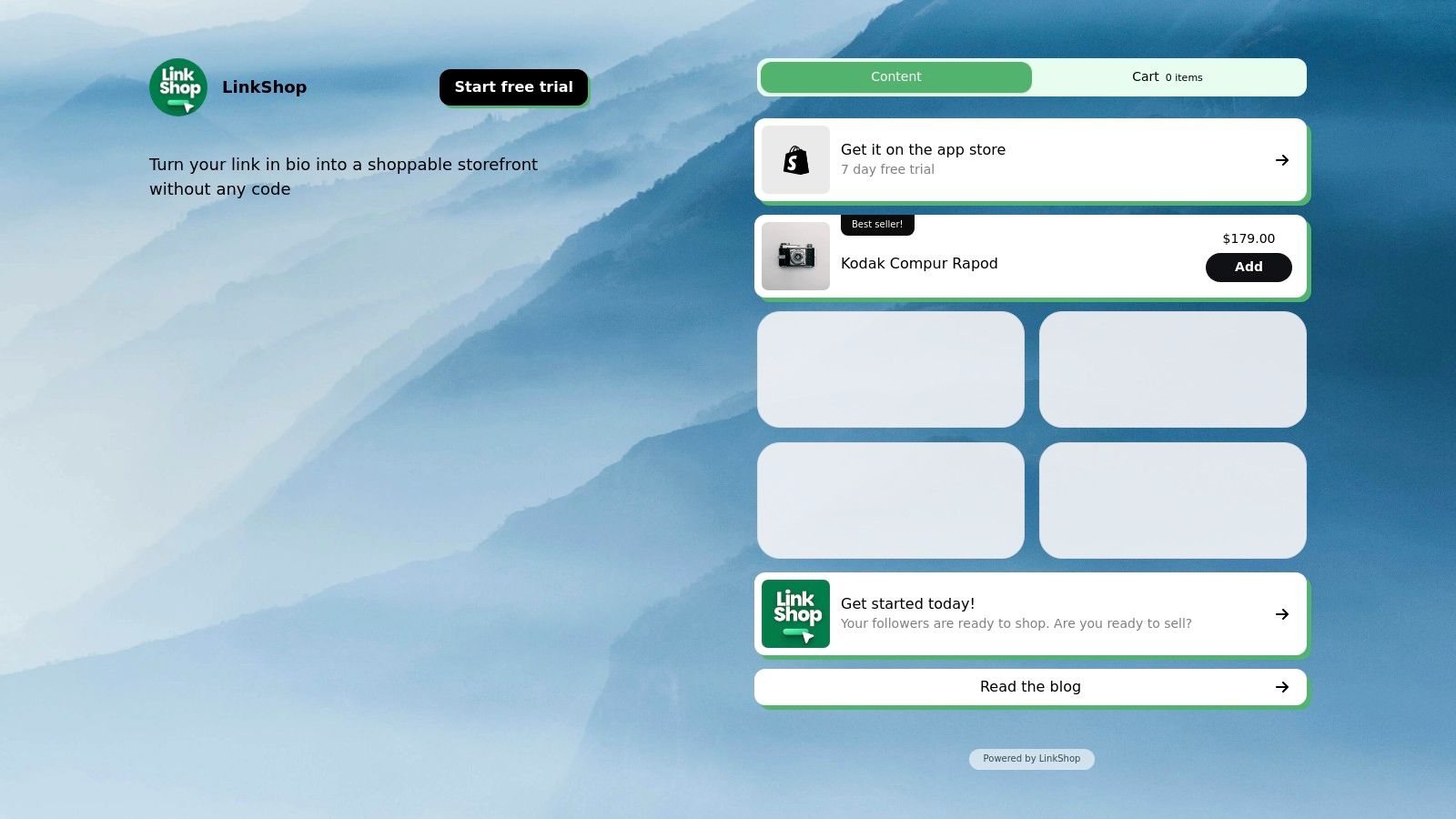
LinkShop’s seamless integration with your Shopify store is a key advantage, offering a more robust and streamlined experience compared to generic link-in-bio tools like Linkpop. For example, inventory management and order fulfillment are directly connected to your existing Shopify setup. This means you won't have to juggle multiple platforms and risk discrepancies.
Key Features and Benefits:
- Seamless Shopify Integration: Automatic synchronization of your Shopify products, collections, and branding, saving you time and ensuring consistency.
- Shoppable Link Pages: Showcase multiple products, offers, and even blog posts within a single, aesthetically pleasing landing page.
- Customizable Design: Tailor the look and feel of your LinkShop page to match your brand's identity with user-friendly customization options.
- Enhanced Brand Presence: Elevate your online presence with a professional and engaging link-in-bio experience that reflects your brand’s style.
- Improved Conversion Rates: Drive more sales by making it easier for customers to discover and purchase your products directly from social media.
Pros:
- Tailor-made for Shopify merchants, ensuring seamless integration with your store.
- Beautiful, shoppable link-in-bio pages that enhance your brand's online presence.
- More powerful and feature-rich compared to standard solutions like Linkpop.
- User-friendly customization options to align with your brand identity.
Cons:
- Exclusively designed for Shopify users, limiting its applicability to other e-commerce platforms.
- Limited publicly available pricing and detailed feature breakdown may require direct inquiry.
Implementation/Setup Tips:
Setting up LinkShop is straightforward. Simply install the app from the Shopify App Store and connect it to your store. Then, customize your link page's appearance, add your products and links, and finally, paste the generated LinkShop URL into your social media bios.
Pricing and Technical Requirements:
Pricing information for LinkShop isn't readily available on their website, so contacting them directly for a quote and a detailed feature breakdown is recommended. The technical requirement is a Shopify store.
Why LinkShop Deserves Its Place on this List:
LinkShop stands out because it addresses a specific pain point for Shopify merchants: maximizing the potential of their social media traffic. It offers a significantly more integrated and powerful solution than generic link-in-bio tools. Its Shopify-centric design makes it a valuable asset for any merchant looking to boost their sales and streamline their online presence. By offering a centralized hub for all your important links and integrating seamlessly with your existing Shopify setup, LinkShop contributes significantly to the overall benefits of using Shopify as your e-commerce platform.
Website: https://getlinkshop.com
2. User-Friendly E-commerce Platform
One of Shopify's most significant benefits is its user-friendly nature, making it a popular choice for entrepreneurs of all technical skill levels. This platform shines in its ability to simplify the often complex process of building and managing an online store. You don't need to be a coding whiz or a web design expert to launch your business with Shopify. Its intuitive interface guides you through every step, from setting up product listings to processing orders. This ease of use allows you to focus on what matters most: growing your business. Whether you’re selling handmade crafts, digital downloads, or physical products, Shopify provides the tools you need in an accessible format.
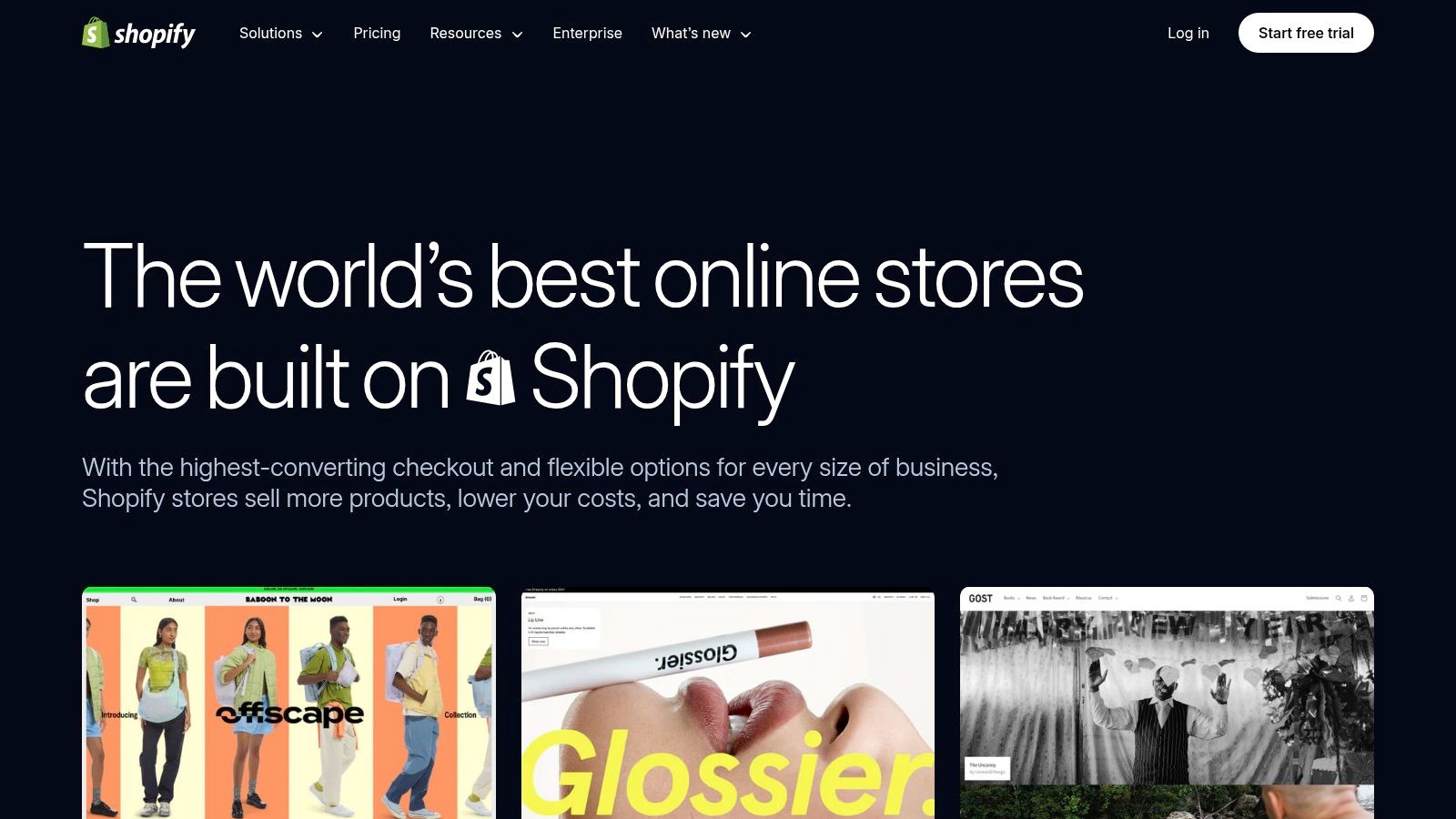
Shopify's drag-and-drop store builder is a game-changer. You can easily customize the look and feel of your online store by simply dragging and dropping elements like images, text boxes, and product displays. Choose from a library of pre-designed, responsive templates that adapt seamlessly to different screen sizes, ensuring a positive customer experience on desktops, tablets, and smartphones. This eliminates the need for complex coding and allows you to quickly create a professional-looking online store. The intuitive admin dashboard provides a centralized hub to manage all aspects of your business, from inventory tracking and order fulfillment to marketing campaigns and customer communication. Everything is designed to be straightforward and easy to navigate, even for beginners.
Shopify offers a range of plans to suit different business needs and budgets. Basic plans start at a relatively affordable price point, providing access to the core features needed to launch an online store. More advanced plans unlock additional features and functionalities, such as advanced reporting and analytics, as your business grows. While specific technical requirements are minimal (primarily a stable internet connection and a web browser), some advanced customizations might require knowledge of HTML, CSS, or Liquid (Shopify's templating language), or the use of third-party apps.
Compared to other e-commerce platforms like WooCommerce or Magento, which often require a steeper learning curve and technical expertise, Shopify stands out for its simplicity. While platforms like Wix also offer user-friendly interfaces, Shopify provides more robust e-commerce specific features and scalability.
Implementation Tips:
- Start with a free trial: Shopify offers a free trial period, allowing you to explore the platform and its features before committing to a paid plan. This is a great way to get a feel for the interface and determine if it's the right fit for your business.
- Explore the theme store: Take advantage of Shopify's vast theme store to find a pre-designed template that aligns with your brand aesthetic and business needs. This can save you significant time and effort in designing your store.
- Utilize Shopify's resources: Shopify offers a wealth of resources, including tutorials, documentation, and a helpful support community, to guide you through the setup process and answer any questions you may have.
Pros:
- Beginner-friendly interface
- Quick store setup (often in less than a day)
- Regular updates to improve usability
- Mobile app for on-the-go management
Cons:
- Limited customization on basic plans
- Advanced features may require third-party apps
- Some users report occasional UI/UX inconsistencies
Website: https://www.shopify.com/online
Shopify's user-friendly platform deserves a high place on this list of Shopify benefits because it democratizes access to e-commerce. By removing technical barriers, Shopify empowers entrepreneurs to focus on building their brands and selling their products, ultimately driving growth and success in the competitive online marketplace.
3. Comprehensive App Ecosystem
One of the biggest Shopify benefits is its extensive app ecosystem, offering a powerful way to enhance your online store's functionality and streamline your business operations. Shopify's App Store boasts over 3,500 apps, developed by both Shopify and third-party developers, covering virtually every aspect of running an e-commerce business. This means whether you need to boost your marketing efforts, optimize your SEO, manage your inventory, or simplify your accounting, there's likely an app designed to meet your specific needs. This centralized hub approach allows you to customize and scale your store while keeping everything managed within the Shopify ecosystem.
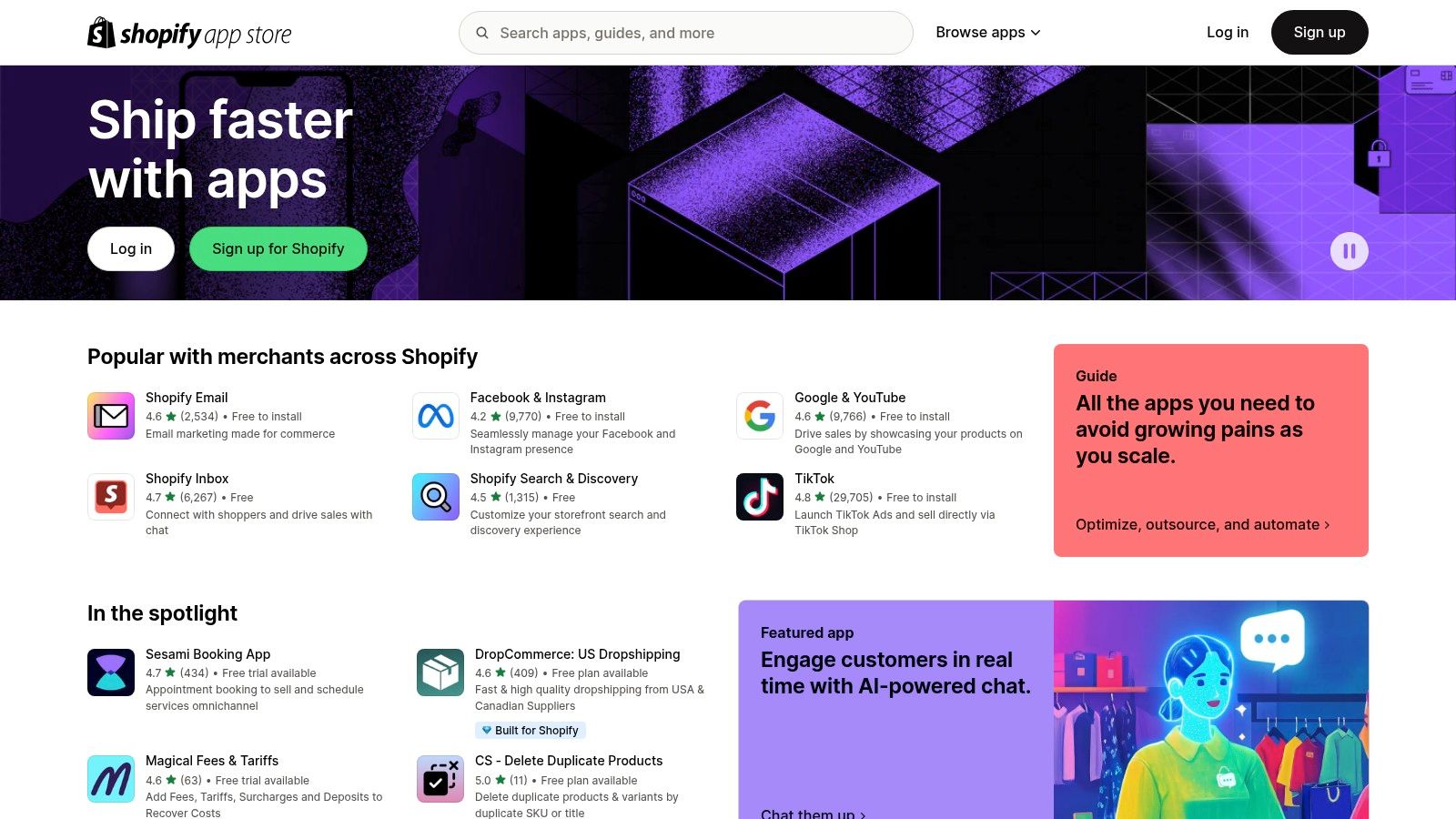
Think of it this way: you can build a solid foundation with Shopify's core features, and then use apps to add specialized tools and capabilities as your business grows and evolves. Need to automate email marketing campaigns? There's an app for that. Want to offer real-time shipping rates? There's an app for that too. Learn more about Comprehensive App Ecosystem and discover how they can transform your Shopify experience. This ability to cherry-pick functionalities makes Shopify highly adaptable to various business models and sizes, a key advantage in the competitive e-commerce landscape.
The App Store is neatly categorized, making it easy to find solutions tailored to your requirements. The one-click installation process simplifies adding new functionalities – no coding required in most cases. Many apps offer free plans or trials, allowing you to test their features before committing to a paid subscription. This wealth of options allows for endless customization possibilities, letting you create a truly unique and optimized store. You can find apps for everything from integrating with social media platforms and building loyalty programs to automating abandoned cart recovery and enhancing customer support.
While the sheer volume of available apps is a huge plus, it's essential to be aware of the potential downsides. Monthly costs can accumulate quickly if you rely on several paid apps. The quality of third-party apps can vary, so it's crucial to read reviews and do your research before installing anything. Occasionally, app conflicts or performance issues can arise, requiring troubleshooting.
Specifically, some popular app categories include:
- Marketing and Sales: Email marketing automation, social media integration, pop-up builders, loyalty programs, and more.
- Store Design: Page builders, image optimizers, theme customizations, and more.
- Shipping and Delivery: Real-time shipping rate calculators, label printing, order tracking, and more.
- Inventory Management: Stock control, automated ordering, and more.
- Customer Service: Live chat, help desk integration, and more.
The Shopify App Ecosystem is a key reason why Shopify is a leading e-commerce platform. The ability to extend the platform's core functionality with thousands of specialized tools offers incredible flexibility and scalability. While managing app costs and ensuring compatibility is important, the benefits of a customized and streamlined online store make the Shopify App Ecosystem a significant advantage for businesses of all sizes.
4. Built-in SEO and Marketing Tools
One of the significant Shopify benefits is its suite of integrated SEO and marketing tools, designed to help you boost your online store's visibility and attract more customers. These tools empower merchants to optimize their stores for search engines and manage various marketing activities directly within the Shopify platform, reducing the need for numerous external platforms and associated costs. This means you can focus on selling, rather than juggling multiple marketing dashboards. For new businesses especially, this centralized approach is a huge advantage, allowing you to manage your entire online presence from a single location.
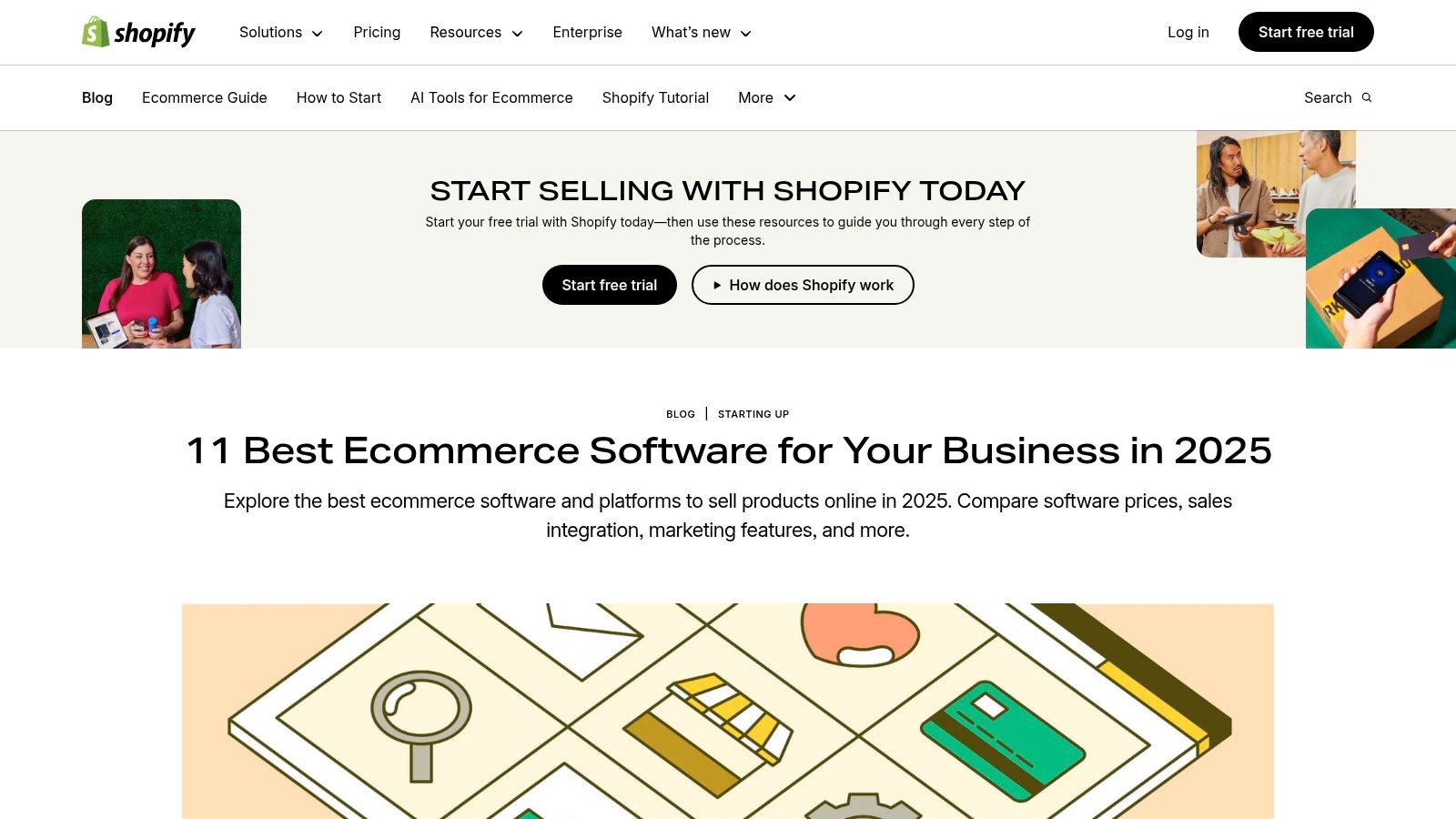
Shopify offers a range of built-in features, from customizable SEO elements like meta titles, URLs, and descriptions, to a built-in blog for content marketing and social media integration for broader reach. Imagine being able to tweak your product page's meta description directly within Shopify, rather than having to navigate a separate SEO tool. This streamlined workflow allows for quicker optimization and more efficient content management. Furthermore, automated sitemap generation ensures search engines can easily crawl and index your website, improving your chances of ranking higher in search results. Integration with Google Analytics provides valuable data on website traffic and customer behavior, enabling you to make data-driven decisions to further improve your marketing strategies. Learn more about Built-in SEO and Marketing Tools to explore how these tools can enhance your conversion rates.
Shopify's SEO-friendly structure right out of the box is a major plus, especially for users without extensive technical expertise. The platform is constantly updated to align with the latest search engine algorithms, ensuring your store remains optimized without requiring constant manual adjustments. This unified marketing dashboard offers a significant advantage over managing disparate tools and platforms, saving time and streamlining your workflow. While some advanced SEO features might require apps from the Shopify App Store (which can add to your monthly costs), the basic functionalities provided are often sufficient for new and growing businesses.
While Shopify's built-in blog functionality offers a convenient starting point for content marketing, it lacks the advanced features of dedicated blogging platforms. Similarly, its email marketing capabilities are relatively basic, potentially necessitating the use of a dedicated email marketing service for more sophisticated campaigns. However, the integrated tools offer a solid foundation, particularly for businesses just starting out. They provide a comprehensive toolkit to build a strong online presence and drive traffic to your store, solidifying their place as a key Shopify benefit.
5. Reliable Hosting and Security
When weighing the benefits of Shopify, the robust hosting and security infrastructure it provides is a significant advantage. This means you don't have to worry about the technical complexities of running an online store, letting you focus on what matters most: growing your business and connecting with customers. Shopify takes care of the backend, ensuring your store stays online and secure. This is a major Shopify benefit, especially for those new to ecommerce or without dedicated IT resources.
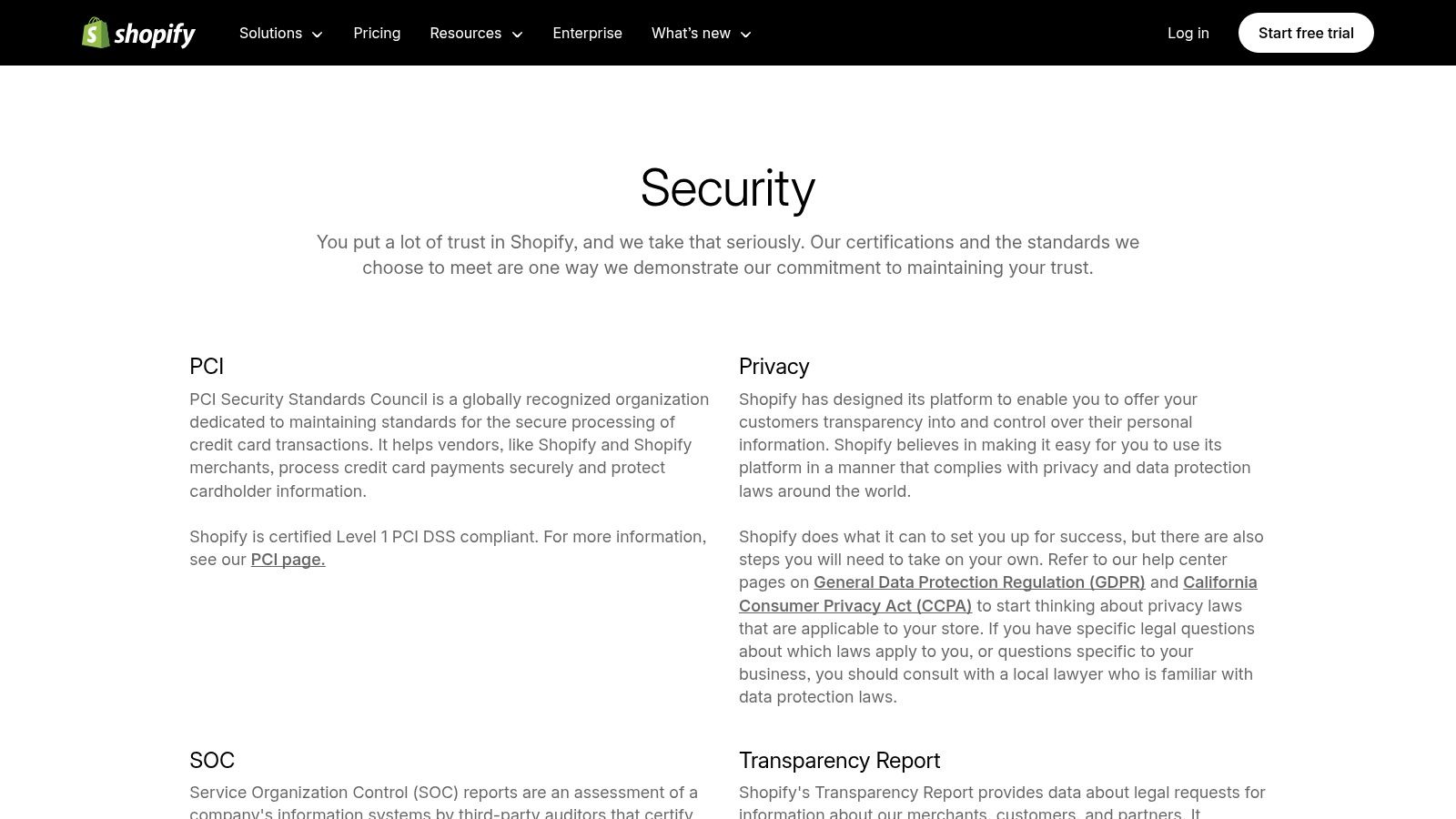
Imagine launching a flash sale and suddenly experiencing a surge in traffic. With Shopify's unlimited bandwidth and 99.99% uptime guarantee, you can be confident your site will handle the influx of visitors without crashing. This reliability is crucial for maximizing sales and maintaining a positive customer experience. Shopify’s hosting infrastructure is designed to handle traffic spikes smoothly, a crucial Shopify benefit during peak seasons and promotional campaigns. Furthermore, automatic platform updates ensure your store always benefits from the latest security patches and performance improvements without any manual intervention on your part. This eliminates the need for you to manage updates or worry about compatibility issues, freeing up your time for other important tasks.
Shopify's security features are also top-notch. The platform is Level 1 PCI DSS compliant, meaning it adheres to the highest standards for processing credit card information. This built-in compliance simplifies the process of accepting online payments and instills trust in your customers. An included SSL certificate encrypts all data transmitted between your store and your customers, further protecting sensitive information. Shopify also provides protection against Distributed Denial of Service (DDoS) attacks, mitigating the risk of your store being taken offline by malicious actors. This robust security infrastructure is a key Shopify benefit, offering peace of mind and allowing you to focus on running your business.
While the included hosting and security features are significant Shopify benefits, there are some limitations to consider. You have limited direct server access, meaning you cannot install custom server software or make low-level server configurations. This lack of control can be a drawback for businesses with highly specialized technical requirements. Additionally, your store's performance and security are entirely dependent on Shopify's infrastructure. While Shopify has a strong track record, any issues with their systems could potentially affect your store.
Pros:
- No separate hosting costs or management
- Protection against DDoS attacks
- Regular security updates
- 24/7 infrastructure monitoring
Cons:
- Limited direct server access
- Cannot install custom server software
- Dependency on Shopify's infrastructure
For more detailed information on Shopify's security features, visit https://www.shopify.com/security. Overall, Shopify’s reliable hosting and robust security are compelling Shopify benefits, particularly for businesses looking for a hassle-free and secure ecommerce solution. They eliminate the need for separate hosting and security investments, making it a cost-effective and practical choice.
6. Multi-channel Selling Capabilities
One of the most significant Shopify benefits is its robust multi-channel selling capabilities. No longer are you confined to just your online storefront. Shopify empowers you to expand your reach and sell your products across a diverse range of online and offline channels, all managed seamlessly from a single dashboard. This means you can connect with customers wherever they prefer to shop, maximizing your sales potential and streamlining your operations. This feature alone makes Shopify a powerful contender in the e-commerce platform arena.
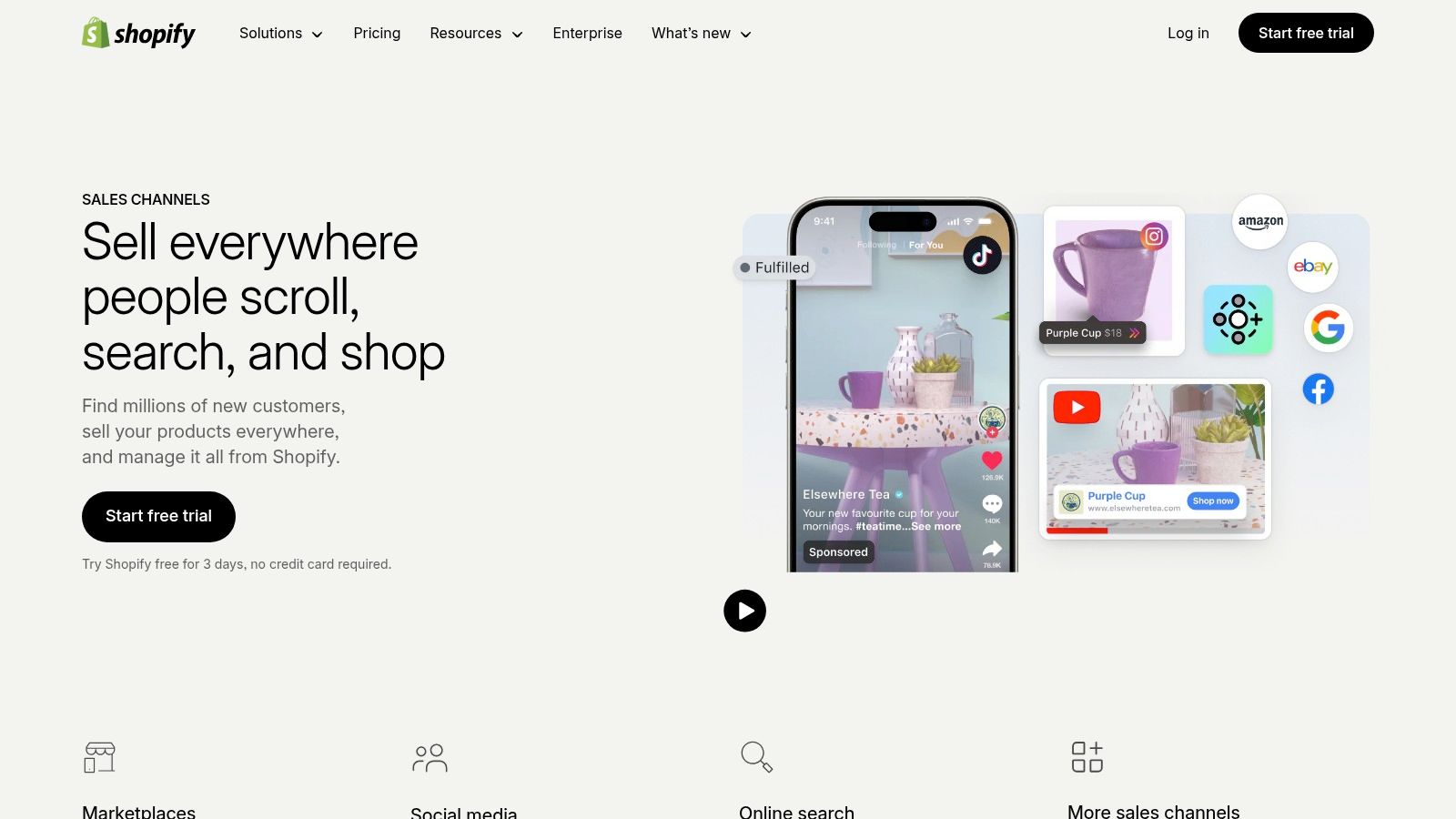
Imagine this: you list a new product on your Shopify store. With just a few clicks, that same product is available on your Facebook and Instagram shops, listed on Amazon and eBay, and even ready to be sold at your physical pop-up shop through Shopify POS. This streamlined approach saves you valuable time and effort, eliminating the need for manual uploads and updates across different platforms. Centralized inventory management ensures stock levels are automatically synchronized across all channels, preventing overselling and keeping your customers happy.
Shopify integrates with major marketplaces like Amazon, eBay, and Walmart, opening doors to vast customer bases. It also connects with popular social media platforms like Facebook, Instagram, and TikTok, enabling social commerce and allowing customers to purchase directly within their favorite apps. For brick-and-mortar businesses, Shopify POS transforms any device into a cash register, bridging the gap between online and offline sales. Learn more about Multi-channel Selling Capabilities and discover how to leverage Instagram for your business.
Features:
- Social media selling integrations: Seamlessly sell on Facebook, Instagram, TikTok, and more.
- Marketplace connections: Expand your reach on Amazon, eBay, Walmart, and other major marketplaces.
- Shopify POS for retail locations: Equip your physical store with a powerful POS system.
- Centralized inventory management across channels: Keep track of your stock levels in real-time, across all platforms.
Pros:
- Unified management of all sales channels: Control your entire sales operation from one central hub.
- Synchronized inventory across platforms: Avoid overselling and stock discrepancies.
- Expanded market reach: Tap into new customer bases on various platforms.
- Consistent brand experience: Maintain a unified brand presence across all channels.
Cons:
- Additional transaction fees for some channels: Be aware of potential fees associated with selling on certain marketplaces.
- Channel-specific rules and limitations apply: Each platform has its own set of guidelines and restrictions.
- More complex setup for multi-channel operations: While Shopify simplifies the process, setting up multiple sales channels requires initial planning and configuration.
While specific pricing for multi-channel features depends on your Shopify plan and the individual channels used, Shopify's website (https://www.shopify.com/channels) provides detailed information on pricing and technical requirements. Compared to managing separate platforms individually, Shopify's multi-channel capabilities offer a significantly more efficient and cost-effective solution.
Implementation Tip: Start with one or two additional sales channels and gradually expand as you become comfortable with the process. Thoroughly research the requirements and best practices for each platform before integrating it with your Shopify store. This strategic approach will help you maximize your success and avoid potential pitfalls.
7. Scalable Pricing Structure: Grow at Your Own Pace with Shopify
One of Shopify's most significant benefits lies in its scalable pricing structure, designed to accommodate businesses of all sizes. Whether you're launching your first online store or managing a multi-million dollar enterprise, Shopify offers a plan that aligns with your current needs and budget, allowing you to scale seamlessly as your business grows. This flexibility means you can start with a basic plan and upgrade to access more advanced features and lower transaction fees as your sales volume and operational complexity increase, all without the hassle of migrating to a new platform.
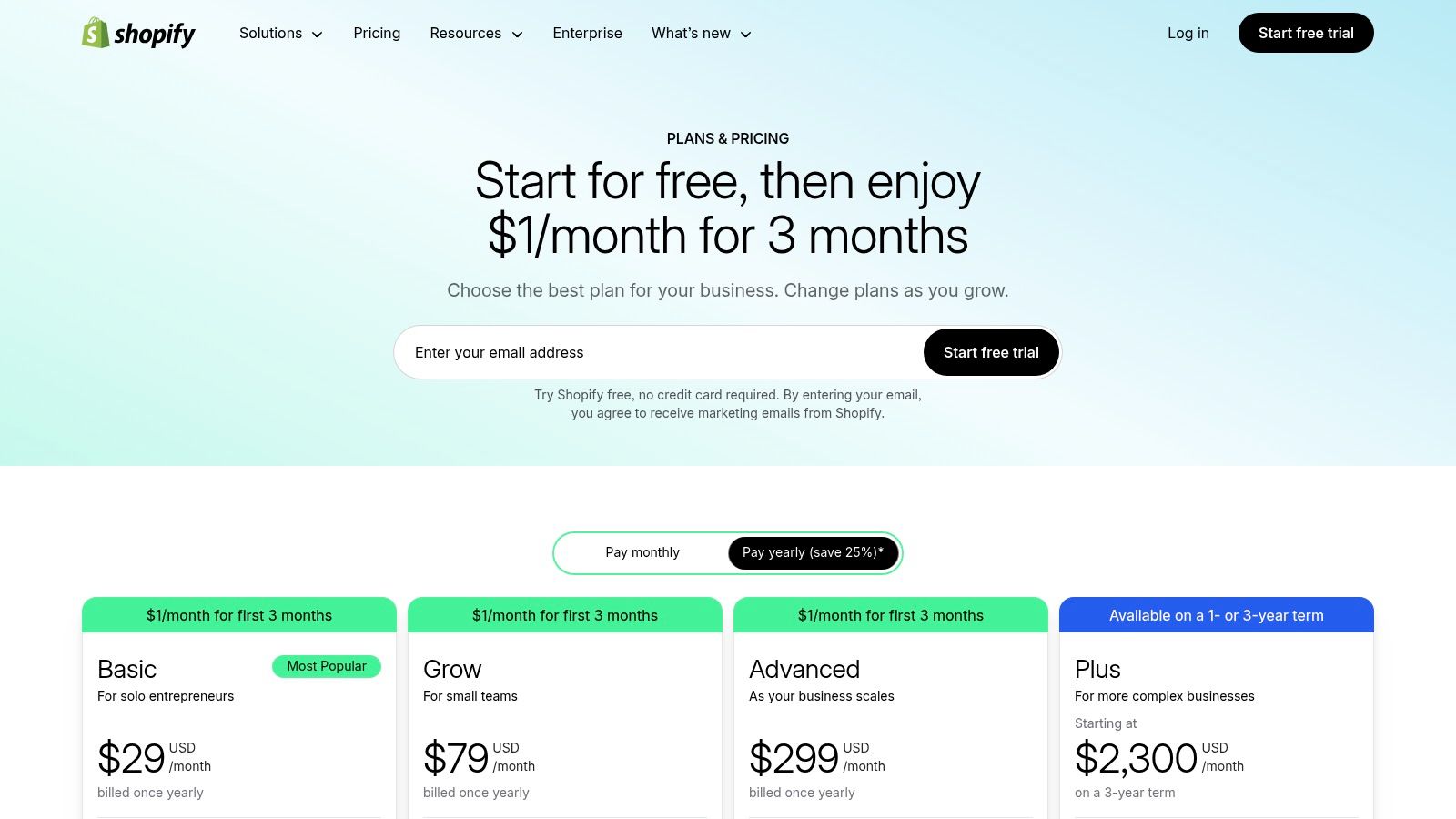
Shopify's tiered pricing model offers a range of options, starting with the Basic Shopify plan at $29/month, ideal for entrepreneurs just beginning their e-commerce journey. As your business expands, you can progress to the Shopify plan at $79/month or the Advanced Shopify plan at $299/month, each unlocking more features like advanced reporting, lower transaction fees, and greater staff accounts. For high-volume, enterprise-level operations, Shopify Plus provides a customized solution starting at $2,000+/month, offering dedicated support, enhanced security, and extensive customization options. Even if you're solely focused on social selling, the Shopify Lite plan at $9/month allows you to integrate sales tools into your existing social media presence.
This scalable approach is a key Shopify benefit because it eliminates the need to prematurely invest in expensive features you don't yet need. It also ensures a smooth transition as your business expands, avoiding disruptive platform migrations that can impact sales and customer experience. This deserves its place in the list because it allows businesses to strategically manage their costs while still accessing a robust platform.
Key Features and Pricing:
- Basic Shopify: $29/month
- Shopify: $79/month
- Advanced Shopify: $299/month
- Shopify Plus: $2,000+/month (enterprise)
- Shopify Lite: $9/month (social selling)
Pros:
- No Revenue Limits: Sell as much as you want on any plan.
- Easy Upgrading: Seamlessly transition between plans as needed.
- Predictable Monthly Costs: Budget effectively with fixed monthly fees.
- Discounts for Annual Payments: Save money by opting for annual billing.
Cons:
- Transaction Fees for External Payment Gateways: Using payment processors other than Shopify Payments incurs additional fees.
- Some Essential Features on Higher Tiers: Certain functionalities, like advanced reporting and international pricing, are limited to more expensive plans.
- Additional Costs for Apps and Themes: Customizing your store with apps and themes can add to your overall expenses.
Implementation Tip: Start with a plan that meets your current needs and budget. Don't overspend on features you won't immediately utilize. Monitor your growth and upgrade to the next tier when your business demands it.
Comparison: While other e-commerce platforms offer tiered pricing, Shopify's clear structure and straightforward upgrade process make it particularly user-friendly. The broad range of plans caters to a wider variety of businesses, from startups to large corporations.
Visit Shopify's pricing page for more details.
8. Expert Support and Community Resources
Running an online store can be challenging, especially when technical glitches arise or you need guidance on scaling your business. One of the key Shopify benefits is its robust support system and thriving community, ensuring you're never left to fend for yourself. This comprehensive network provides assistance 24/7, catering to both immediate troubleshooting needs and long-term strategic planning. Whether you're a beginner struggling with setting up your store or a seasoned entrepreneur looking to optimize conversions, Shopify has resources to help you succeed.
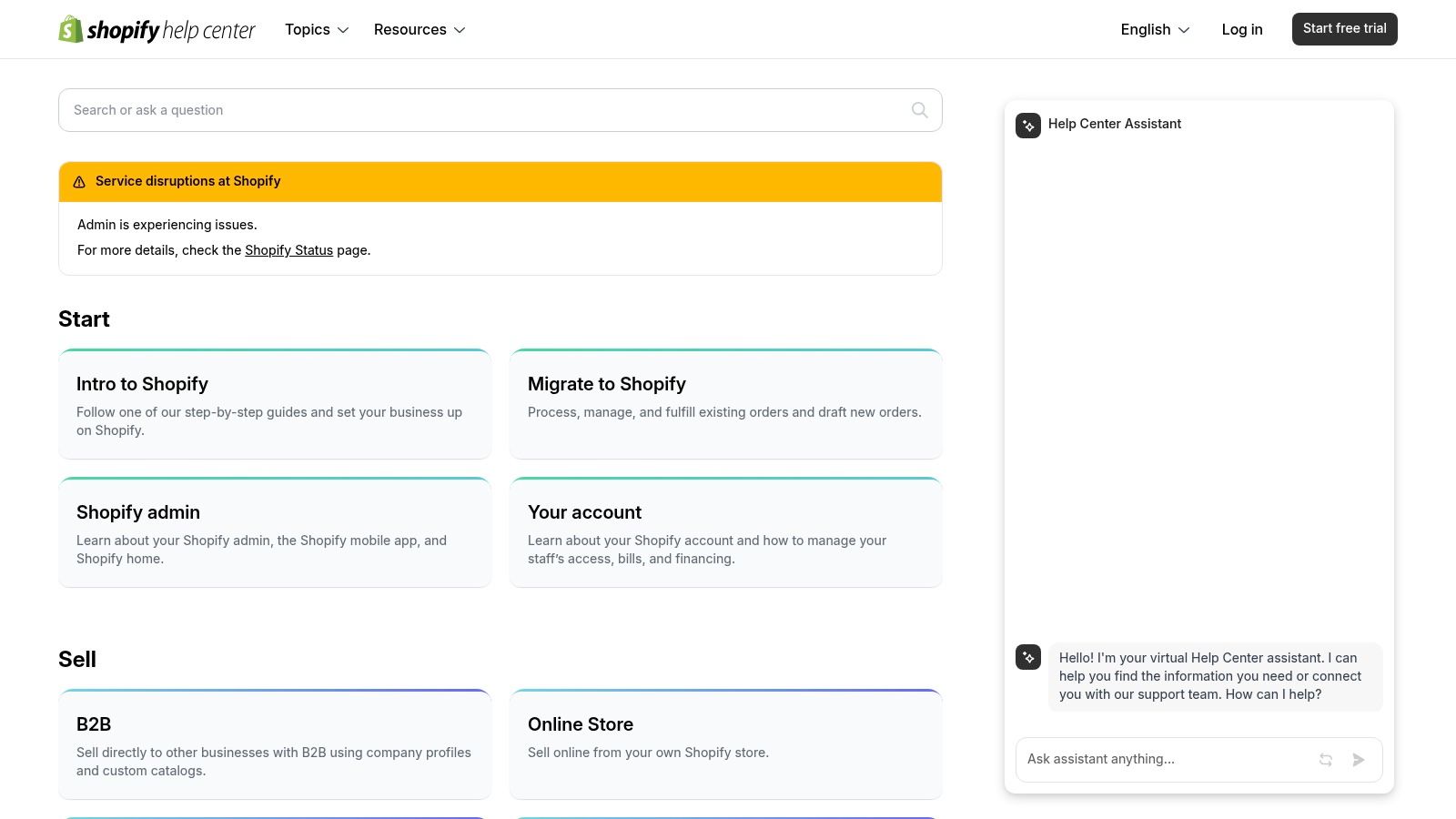
Shopify offers 24/7 support via chat, email, and phone. This multi-channel approach allows you to choose the communication method that best suits your needs and urgency. For quick fixes and simple questions, the live chat feature is incredibly convenient. For more complex issues or detailed explanations, email or phone support provides more in-depth assistance. Beyond direct support from Shopify representatives, you gain access to an extensive ecosystem of resources. This includes the Shopify Community forum, a bustling hub where merchants share tips, troubleshoot problems, and discuss best practices. The official Help Center provides comprehensive documentation and tutorials, offering self-service solutions to common queries. Shopify also hosts educational webinars covering a wide range of topics, from marketing strategies to inventory management. Finally, the Shopify Experts marketplace connects you with certified professionals who can offer specialized assistance with store development, design, marketing, and more.
For example, imagine you're experiencing an issue with your checkout process late at night. Instead of panicking and waiting until morning, you can reach out to Shopify's 24/7 support via live chat and get immediate assistance. Or, perhaps you're looking to improve your store's SEO. The Help Center offers detailed guides on SEO optimization, while the Shopify Community forum allows you to connect with other merchants who have successfully implemented SEO strategies. If you require more personalized guidance, you can hire a Shopify Expert specializing in SEO to provide tailored recommendations.
Features:
- 24/7 support via chat, email, and phone
- Extensive help documentation
- Active community forums
- Shopify Experts marketplace
- Educational resources and webinars
Pros:
- Fast response times for technical issues
- Multiple support channels cater to different preferences
- Self-service knowledge base empowers users to solve problems independently
- Access to professional service providers for specialized needs
Cons:
- Response quality can vary depending on the complexity of the issue and the support representative
- Some advanced questions may require paid expert consultation
- Support tier differences exist based on your Shopify plan level. Higher-tier plans typically offer prioritized support.
Website: https://help.shopify.com/
This comprehensive support system is a significant Shopify benefit, contributing to its user-friendliness and making it a suitable platform for businesses of all sizes. The availability of 24/7 support ensures business continuity, while the vast network of resources empowers merchants to continuously learn, improve, and grow their online stores. This combination of self-service options, community interaction, and professional assistance sets Shopify apart from many other ecommerce platforms, solidifying its position as a leader in the industry.
8-Point Shopify Benefits Comparison
| Item/Service | Implementation Complexity (🔄) | Resource Requirements (⚡) | Expected Outcomes (📊) | Ideal Use Cases (💡) | Key Advantages (⭐) |
|---|---|---|---|---|---|
| LinkShop | Moderate – Tailored for Shopify; integration setup needed | Requires a Shopify store and brand assets | Enhanced engagement and increased sales via shoppable links | Shopify merchants seeking a unique bio experience | Seamless integration, high customization |
| User-Friendly E-commerce Platform | Very Low – Drag-and-drop builder simplifies setup | Minimal technical support and design resources | Fast store setup and easy management | Entrepreneurs and beginners in e-commerce | Intuitive interface, quick launch |
| Comprehensive App Ecosystem | Moderate – Integration with multiple third-party apps | Varies – May need additional investments for apps | Customized functionality across various business operations | Businesses wanting advanced customization and specialized tools | Extensive app selection, versatile solutions |
| Built-in SEO and Marketing Tools | Low – Integrated SEO and marketing elements | Minimal – Most tools built-in; occasional app add-ons | Improved online visibility and optimized traffic flow | Merchants looking for all-in-one SEO and marketing support | Unified, out-of-the-box marketing and SEO features |
| Reliable Hosting and Security | Low – Managed by Shopify with enterprise-grade systems | Little technical upkeep; included in subscription | High uptime, strong security, and worry-free hosting | Businesses prioritizing secure and hassle-free performance | Robust hosting, enterprise security standards |
| Multi-channel Selling Capabilities | Moderate – Requires setup across multiple channels | Needs integration with social, marketplace, and POS | Expanded market reach with synchronized inventory and centralized control | Sellers aiming for omnichannel presence and streamlined operations | Unified channel management and broad market access |
| Scalable Pricing Structure | Low – Straightforward tier upgrades | Budget dependent; flexible spending with growth | Ability to scale features and lower fees as business expands | Businesses starting small with plans to upgrade over time | Flexible, predictable pricing with smooth upgrade path |
| Expert Support and Community Resources | Low – 24/7 multi-channel support available | Leverages both official support and community assets | Timely assistance and insightful resources improve problem solving | Merchants in need of consistent support and industry expertise | Round-the-clock help combined with a vibrant community ecosystem |
Ready to Reap the Shopify Benefits?
From its user-friendly interface and comprehensive app ecosystem to its built-in SEO tools and multi-channel selling capabilities, the Shopify benefits covered in this article highlight why it's a leading e-commerce platform. Remember, key takeaways include leveraging tools like LinkShop, exploring the vast app marketplace, and utilizing Shopify's built-in marketing features. Choosing the right tools and apps depends on your specific business needs, so consider your goals, budget, and target audience when making your selections. When implementing new tools, careful planning and integration are crucial for a smooth transition and optimal performance. Need a comprehensive overview of all that Shopify has to offer? The E-commerce Dev Group offers a valuable resource: "Shopify services" – their guide provides everything you need from store setup and payment processing to marketing tools and SEO optimization, simplifying the process of building, managing, and scaling your online store.
By understanding and capitalizing on these Shopify benefits, you can create a thriving online store. Success in the competitive e-commerce landscape of 2025 and beyond relies on adapting and using the right tools for the job. Ready to streamline your Shopify workflow and boost your sales? Check out LinkShop to amplify your marketing efforts and maximize your brand's reach across multiple platforms, taking full advantage of the multi-channel selling power of Shopify.



